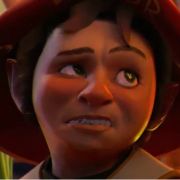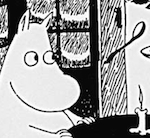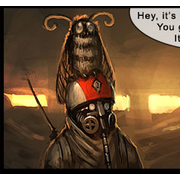|
Squidtentacle posted:I had a really hard time with outlines because I could not focus on something that felt so open-ended. Someone somewhere recommended the snowflake method and it really helped ground me on where to start and where to go. Basically start from a sentence, then elaborate that sentence into a paragraph, then each sentence into its own paragraph, etc. I'd definitely suggest giving that a try if you're having trouble figuring out how to start. I mean, I love breaking stories so it may just be that I'm at the other extreme. But I generally start with a short, broad outline on Docs, getting the basics down. Beginning, middle, end, broad character arcs, big set pieces, etc. Then I'll physically notecard everything out with different scenes, characters, items, moments, parts of character arcs, etc. all getting their own color-coded cards. Then I shuffle them all around, rewrite them, add new ones, toss other ones on, etc. until I've broken the story and figured out the character arcs and where major moments fit in and what the themes are and how they manifest in the story. Then I make a new, more detailed outline on Docs again and flesh each beat/chapter out with sub-bullet points and flesh out as much as I can up top. Then when I actually sit down to write, it's easy breezy, just writing out the scenes and filling in the gaps. Sometimes I have to go back and rework things as I fill those gaps in, but it's a whole lot better than writing to no end. To me when I write without outlines, at best I get a pretty good first act that kind of fizzles out then goes nowhere. When I actually know where it's going, when the character arcs are clear, when the themes are clear, it both makes the first act far more impactful and actually goes somewhere with purpose.
|
|
|
|

|
| # ? May 22, 2024 18:02 |
|
feedmyleg posted:To me when I write without outlines, at best I get a pretty good first act that kind of fizzles out then goes nowhere. This is me right now, stuttering at 8,000 words after hammering out blind.
|
|
|
|
It's not like you have to get crazy about outlining like me. But looking at screenwriting story breaking techniques might be helpful for longform fiction writers as well. Using beat sheets can be wonderfully helpful at least as a launching point.
|
|
|
|
This is all helpful info to ruminate on, thanks. And yeah, I plan to give snowflake method a spin at least once. I think I have a weird twofold problem with outlining where I both don't spend enough time in developing the outline, and also feel too constrained by it. It would seem to me the solution is to write more outlines to improve that particular skill, and find a way to be more ready to say gently caress it to the outline when the story feels like it should go a different direction.
|
|
|
|
|
I've tried several types of outlining in the past, but I have trouble staying on track once the actual writing begins. Partway through, the characters take on a life of their own and the story starts diverging until the remainder of the outline makes no sense at all. The snowflake method sounds intriguing, though. Maybe next time.
|
|
|
|
I can't outline because I can't properly envision story events until I actually write them out. I jump in with an idea of the beats I want to hit and work it all out in editing. It does mean a lot of rewriting, but oh well.
|
|
|
Djeser posted:I can't outline because I can't properly envision story events until I actually write them out. I jump in with an idea of the beats I want to hit and work it all out in editing. It does mean a lot of rewriting, but oh well. I suspect this is more how I lean, but I've struggled with losing steam around the halfway mark on past attempts at a book, and I feel like a lot of times it's due to not really knowing where the book is going. I figure the options are "start with an outline next time", "stop there and outline what you have so far to get a 1000-foot view", or "just knuckle down and write through the uncertainty" but I'm not sure which option is the right one, or even that it'd stay the same from project to project.
|
|
|
|
|
MockingQuantum posted:I suspect this is more how I lean, but I've struggled with losing steam around the halfway mark on past attempts at a book, and I feel like a lot of times it's due to not really knowing where the book is going. I figure the options are "start with an outline next time", "stop there and outline what you have so far to get a 1000-foot view", or "just knuckle down and write through the uncertainty" but I'm not sure which option is the right one, or even that it'd stay the same from project to project. Yeah this is me, I can get to the halfway point then I just founder. I think having an outline you ignore is still better than no outline because you're making the decision that your new idea is better than the outline. Also, no need to crit you enter thunderdome, just write a story.
|
|
|
|
I was writing a book once that HAD to have a particular story beat. I mean, that was the linchpin of the story, that a character would do a thing which dominoes into a gigantic disaster which would be the theme of everything afterward. I'd written several chapters, got up to that point in the story, and had a horrific realization: this character that I'd built up in all the preceding chapters wouldn't do the thing. He might want to do the thing, but he would probably talk himself out of it. I didn't want to have to scrap the whole preceding part, and I didn't really want to change the character. Ultimately I wrote an extra chapter to add more incentive, while trying not to make it seem like I was pushing. So that's what usually happens when I plan ahead: I'll be writing happily along and realize, oh, poo poo, the turn I want is half a block ahead and I'm in the wrong lane.
|
|
|
|
I mean, I figure that's what drafts are for. Three-quarters through my first draft I realized that I had a massive third act problem and needed to do some serious structural work because a lot of character and theme issues had come up as I moved toward my climax. I ended up rearchitecting the whole thing and right now I'm three-quarters through the second draft. I ended up rewriting about half of what I had completely from scratch and significantly modifying the other half, but for me at least it's a process of going back and forth between outline and prose that helps things be as strong as they can. There's probably a more efficient way of doing it, but at least for me always working with more planning is better than less, even if I deviate. But I'm still just figuring out what works for me. I come from a screenwriting background so I probably have a fairly different process than most prose writers. It probably doesn't help that I decided to write an intricate mystery with parallel narratives as my first novel which means that my whole structure has to be clockwork... feedmyleg fucked around with this message at 17:30 on Aug 1, 2018 |
|
|
|
MockingQuantum posted:I suspect this is more how I lean, but I've struggled with losing steam around the halfway mark on past attempts at a book, and I feel like a lot of times it's due to not really knowing where the book is going. I figure the options are "start with an outline next time", "stop there and outline what you have so far to get a 1000-foot view", or "just knuckle down and write through the uncertainty" but I'm not sure which option is the right one, or even that it'd stay the same from project to project. My two options are usually go back and start from the beginning again or just plow straight on through and sort it all out in editing. In some ways, a bad rough draft is just a really wordy outline.
|
|
|
Djeser posted:My two options are usually go back and start from the beginning again or just plow straight on through and sort it all out in editing. In some ways, a bad rough draft is just a really wordy outline. Yeah I'm leaning more and more towards the latter the longer I write. Honestly I've kind of started treating first drafts as some sort of draft/outline amalgamate monstrosity, where I'll get to sections that I'm not sure how to write and the writing kind of turns into stream-of-consciousness bullet point language. "The hero reached the house where there will be indeterminate unpleasant things happening to their sidekick, also I need to introduce the villain's objective in the chapter before this, so just pretend he's doing all this for a reason." Stuff like that, and if I'm sensible and of sound mind I'll underline it or mark it up somehow so I don't give myself a stroke when I'm reading it in the edit.
|
|
|
|
|
I write it all out as if it's a proper story, but sometimes I'll lay down prose that I know is complete garbage just so that I can move on, since I know I'll come back in editing and go "oh, that's complete garbage". I keep trying, since every so often something tumbles out that makes it into the final, but I try not to get too caught up when I can't get something to turn out right. Another thing I do is I often wind up redoing the last couple paragraphs when I start for the day, especially when I stopped previously because I had some kind of block or another.
|
|
|
|
Yeah, as things shift and change in my second draft I'm going back and adding a ton of notes of things to change as I go, then writing the new chapters as if those changes had already been made.
|
|
|
|
Djeser posted:In some ways, a bad rough draft is just a really wordy outline. Yeah, this is exactly why I call it draft zero. It's basically this: MockingQuantum posted:Yeah I'm leaning more and more towards the latter the longer I write. I like to put my notes in brackets, and editorial notes in square brackets to make them as noticable as a brisk slap in the face. Especially when I start going all stream-of-consciousness in my push to get literally anything on the page when I don't know what the hell to do next. Usually I only have a vague story arc in mind when I start, and don't bother outlining until I'm halfway through my draft zero and have a better sense where I'm going with it. It probably does take longer jumping back and forth, writing poo poo that's going to get cut, and reworking scenes multiple times, but this way I get the work done and probably end up with a better story in the end than if I tried to force myself to stick to the first idea that came into my head. Stuporstar fucked around with this message at 23:23 on Aug 1, 2018 |
|
|
|
Stuporstar posted:writing poo poo that's going to get cut i hand-write my draft zero (i must, don't ask me why, it's a mystery to me too) and when i get into those scenes where i have to write 3000 interminable meandering words of which i know before i even start that maybe 400 will make it into the final project, that's usually about five, six hours of work. when you know you're going to cut it all, and you know that as you're writing it, and you know that it's all bloat that's as boring to write as it will be to read but you have to write the bloat so you can pick through it later for the meat, those are some very long hours
|
|
|
|
I'm having the most success with a pattern of outlining, drafting, loving up, re-outlining with the new trajectory in mind, loving that draft up, re-outlining again, and eventually winding up with what feels like a final, realized plot. My current WiP began as a short story (10K words) that I rewrote almost 3 full times. Then I outlined a lovely novel, got 20 or 30k into that novel, realized my trajectory was too hosed to be worth it, re-re-outlined, started another lovely attempt, took a "break" to write another short story that takes place in my novel's setting, realized that short story actually made decent novel content, and now I'm redrafting from there. Everything up until now has felt like draft 0. There's a smoothness to this attempt that hasn't been there before, and I feel like I know the characters and setting a lot better. Can't wait to see how I gently caress it up!
|
|
|
|
I'm the kind of writer who needs to know where the story will end before I start, and I often have several major scenes scattered around in my mind. That still leaves gaps connecting them, so I'm trying the Snowflake method because it's not like it'll hurt. I've discovered to my surprise that even the simple character summary step (what is their concrete goal, their general ambition, their personal values) it's actually helping me develop my characters. I'm learning things about my characters I hadn't known. Mirage posted:I was writing a book once that HAD to have a particular story beat. I mean, that was the linchpin of the story, that a character would do a thing which dominoes into a gigantic disaster which would be the theme of everything afterward. I'd written several chapters, got up to that point in the story, and had a horrific realization: this character that I'd built up in all the preceding chapters wouldn't do the thing. He might want to do the thing, but he would probably talk himself out of it. I have put aside a story I have been thinking about for ages because my goal was to have two equal protagonists, each with a story arc. I did figure out both story arcs, but well, it's two stories welded together. While the pieces fit perfectly and I couldn't tell the story if I split them into different stories, it means the story isn't simple to explain. It's probably too difficult for my first big project, so I should start with something simpler. (Also, another reason I've set it aside is because I have not figured out how to solve my issue where too much of the story doesn't have any characters in it except my two protagonists. Nor have I figured out how to get other characters to fit there.)
|
|
|
|
I've tried outlinin a lot, and I tried it very very hard, and each time it made whatever I was writing way shittier than the stuff I wrote without an outline. It might be more important if you're doing more plot-based spec-fic as opposed to more literary work, but it totally hampers some writers. That being said, I find I need to have a theme to explore/a question for the story to ask, and it's good to either have an ending or a key scene or two in mind to work towards. I've done a couple of ~20k word novellas this year, and while I didn't outline, I did keep in mind a very rough version of that Story Engineering book (which was somewhat useful, if an awful read): Four acts. Act 1: set up the world. Something happens to change it. Act 2: protagonist/s are reactive, more dealing with the change. Act 3: protagonist/s are pro-active, actively trying to make something happen. Act 4: sacrifices are made, the world breaks apart. I think, "by the book", they're supposed to be of equal length but for me the first act has worked better when very brief. Honestly that thing helped a lot with pacing and saved my arse, but any time I tried to actually outline more than "this should happen in the next chapter and also this element should come back much later", the story plummeted into mediocrity. I wouldn't even do that for a short story. For shorts I recon you definitely don't need an outline as long as you have a question or an ending. You'll probably have to write slower without an outline, though. If you consider the world and the forces acting on the characters, inner and outer, and the questions the story wants to explore, and you do write in a considered methodical way, if you're anything like me you may get far more interesting and surprising results than a pre-written outline. If you're not and your stuff is better with outlining, I am jealous, that poo poo sounds rad and fun. I've not tackled a novel, though, and if I did, I think a sketchy outline would be a necessity regardless of all of the above.
|
|
|
|
Hopefully this is the right thread I've been building stories in my head since I was 15. First few years just "this would be cool scene" then it started to flesh out as a book worth of material. Then several. Then after 10 years, my head was full of history, characters, rules for magic, major events, timelines of civilizations and settings. And it grew. And it boiled. I think about it constantly. I could not bear it, I knew I had to write it down just for the sake of my mental health. And last year, I started writing it down, I had vacation at autumn. Wrote 2k words. Then stopped. It was not good. I was very sad. Lots of thinking. Lot less writing. Story grew. Fleshed out how the events would play out step by step. Then half a year after that, continued. For last 6 months I wrote 1k words about every 2 weeks. Just one day. Sit down, write 1-2k words. Stop. Then continue later. Much later. I was miserable. I wanted to write the stories in my head. But my depression put me down to reality. What is the point of writing poo poo? Every time I started, next day I didn't want to. What is the point I though. Then last weekend, I started writing daily. Today 40k words have been written down. Last week has been joy. The parts that I wrote down, i don't think about them anymore. I was "free" of them. I am about 1/4th way trough of the first book worth of story. I know it is generic as all hell and first publisher I took it to will most likely laugh me out of building. I know fantasy is a bloated corpse of a genre, and my book belongs to 99% of it's part that is poo poo, most likely the worst half of it. But I don't care. I have 6 books worth of story. I will write it down. I don't care if it rots in the cursed USB that has the misfortune of bearing it. I don't care if nobody likes it. I just want to be free of these stories. I have been with them for 13 years. I have to write them down before they consume me. I just want to be free of them after 13 years of thinking about them. Anyways that was my mental breakdown. Thanks for listening. (Title of the book [and bigger saga/universe/series] I call "Curse of the Dying Fairy")
|
|
|
|
Congratulations  Now it's all gonna be about keeping it up. You can do it!
|
|
|
|
That's a solid attitude, good on you.
|
|
|
|
Taikuri you're doing so well! Keep it up, you're doing great!
|
|
|
|
Thanks, spend 3 hours today writing it again. It feels so much easier to write it now that I got it going. Starting the progress was really the hardest part.
|
|
|
Taikuri posted:Thanks, spend 3 hours today writing it again. It feels so much easier to write it now that I got it going. Starting the progress was really the hardest part. It really is. Remember that if you ever find yourself in a situation where you've taken a break from writing and are struggling to get back into it. In most people's experience, it seems like it never gets much easier to get that momentum going, but it'll always be the case that once you get past the struggle of getting the ball rolling, it's easier to keep up with it.
|
|
|
|
|
My cousin shared a book in Google Docs that she would like me to proofread and critique. Does anybody have any methods that they like for a digital, online doc? I'm not sure about a good way to make notes. Printing it out isn't really an option, since I wouldn't be able to get it back to her. I don't want to edit anything, just make suggestions and let her decide everything. I've thought of putting things in bold parentheses.
|
|
|
|
Google Docs has a built-in commenting system. If you don't want to comment directly on her draft, make a copy and then comment on that.
|
|
|
|
Juanito posted:My cousin shared a book in Google Docs that she would like me to proofread and critique. Does anybody have any methods that they like for a digital, online doc? I'm not sure about a good way to make notes. Printing it out isn't really an option, since I wouldn't be able to get it back to her. do comments, it's native to gdocs. I'd also start with your overall feelings about the work as a whole or in large sections, don't leap into a line-by-line. Things like 'i got bored on page 15' or 'i wanted to skip over chapters with Sarah the OCD woodworker' are super useful, critiquing individual word choices are less so and it's a much less daunting job. Also confirm how harsh she wants you to be at the outset, like on a scale of 1 to 10.
|
|
|
|
sebmojo posted:do comments, it's native to gdocs.
|
|
|
|
This was mostly (entirely?) copied from Stuportar's OP in the last fic advice threadDr. Kloctopussy posted:Reader’s Critique:
|
|
|
|
Juanito posted:My cousin shared a book in Google Docs that she would like me to proofread and critique. Does anybody have any methods that they like for a digital, online doc? I'm not sure about a good way to make notes. Printing it out isn't really an option, since I wouldn't be able to get it back to her. Definitely use the builtin comments. I will say, making comments all the way through about how you're feeling and what you're thinking (while verbose) can be very useful for the writer to find those spots where things are/aren't working or are taking too long to pay off. It can be really useful to get a stream of consciousness all the way through. Also, comments like "I really like this scene/sentence/whatever" can be very welcome pick-me-ups that forestall the "burn it all -down" voices so don't forget to add good stuff along with the critical stuff.
|
|
|
|
yeah, don't try and fix it for her, just do a running commentary.
|
|
|
|
What's the best forum for just putting short-form writing out there? Is there something like a writer's ArtStation? I've been doing a weekly flash fiction thing just to see if I can hit deadlines and let go of imperfect pieces and putting them up on my personal Tumblr for accountability, but that's hardly ideal.
|
|
|
|
Terrorforge posted:What's the best forum for just putting short-form writing out there? Is there something like a writer's ArtStation? I've been doing a weekly flash fiction thing just to see if I can hit deadlines and let go of imperfect pieces and putting them up on my personal Tumblr for accountability, but that's hardly ideal. Thunderdome is very good for this.
|
|
|
|
Not sure if this is the best place for this question, but I've got the crazy idea of applying for an MFA program. My problem is that my educational and employment history have been decidedly not fiction oriented. (Worked as a paralegal.) So, who should I be asking for letters of recommendation?
|
|
|
|
Terrorforge posted:What's the best forum for just putting short-form writing out there? Is there something like a writer's ArtStation? I've been doing a weekly flash fiction thing just to see if I can hit deadlines and let go of imperfect pieces and putting them up on my personal Tumblr for accountability, but that's hardly ideal. What are you looking for, To grow your audience? To get feedback/crits? Do you just want to be held accountable to post a weekly story?
|
|
|
|
Guiness13 posted:Not sure if this is the best place for this question, but I've got the crazy idea of applying for an MFA program. My problem is that my educational and employment history have been decidedly not fiction oriented. (Worked as a paralegal.) So, who should I be asking for letters of recommendation? It can depend on the kind of school you're applying to. What program(s) are you looking at?
|
|
|
|
I'm looking at University of Michigan.
|
|
|
|
Guiness13 posted:Not sure if this is the best place for this question, but I've got the crazy idea of applying for an MFA program. My problem is that my educational and employment history have been decidedly not fiction oriented. (Worked as a paralegal.) So, who should I be asking for letters of recommendation? My first question is what you want out of it. I’m very wary of grad degrees without realistic expectations.
|
|
|
|

|
| # ? May 22, 2024 18:02 |
|
Realistically, what I'm most likely to get out of it is a rejection letter. Don't get me wrong, I'm enthusiastic about the idea, and I want it, but I've done some research into U of M's program and I'm not blind to my chances here. But, if I did get in, it would be 2-3 years of funded writing time with an adviser for guidance. And, yeah, also classes, both to take and possibly teach (god help me). I'm not looking for a silver bullet, but it would give me time and guidance, one of which I need, the other of which I want. As for why U of M, it's local to me. As for why not any of the other, similar programs, I have a very good reason to stay in Michigan for another ten years. Namely, an eight year old. As for why not any of the other local programs, U of M was the only one that guaranteed a stipend.
|
|
|






















